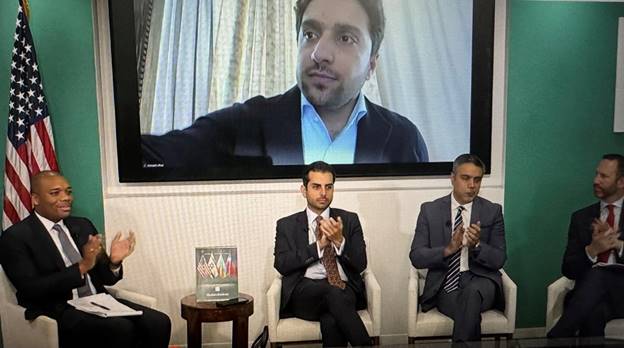
Hudson Institute Hosts National Resistance Front Leaders for Update on Taliban-led Afghanistan
By Elaine Pasquini
Washington: On the third anniversary of the Taliban takeover of Afghanistan, the Hudson Institute hosted Ahmad Massoud, leader of the National Resistance Front of Afghanistan (NRF); Ali Maisam Nazary, head of foreign relations for the NRF; Ambassador M. Ashraf Haidari and Hudson Institute senior fellow Luke Coffey, author of a recent report on why the US should support the NRF.
Appearing virtually, Ahmad Massoud, the 35-year-old son of the late historic freedom fighter Ahmad Shah Massoud, and a graduate of the Royal Military Academy at Sandhurst, shared his thoughts on critical issues that affect the people of Afghanistan today.
Exhausted by years of conflict, the Afghan population is increasingly desperate for liberation from the Taliban’s regime which continues to impose “draconian policies on Afghans’ daily lives, particularly on the women of Afghanistan,” Massoud said, “Over the past three years, their illegitimate rule has shattered any illusion of a more pragmatic or moderate Taliban.”
In addition, the Taliban, he said, are providing “a safe haven for terrorists,” with more than 21 terrorist networks operating within the country, including al-Qaeda and the Islamic State Khorasan Province (IS-K).
According to Massoud, the NRF is the only force within Afghanistan working to counter these terrorist threats, adding that it is the NRF’s national duty to defend the right of the Afghan people to have a better life and freedom.
The NRF leader criticized the international community’s “policy of appeasement” of the Taliban. “While the Taliban may control the country, they do not represent the will of the population,” he said. “Afghanistan’s youth, especially young girls, have dreams and aspirations no different from their peers around the globe.” According to a recent UN report, only four percent of the Afghan population support the Taliban and their ideology. It is important, therefore, that the international community recognizes and assists the Afghan people in their quest for democracy, he insisted.
Following Massoud’s virtual appearance, Jeremy Hunt of the Hudson Institute moderated an in-person panel to continue the discussion.
Ali Maisam Nazary, head of foreign relations for the NRF of Afghanistan, explained that since its founding three years ago, the NRF has not received any external assistance. Both the regional and international communities have stayed away from supporting the resistance against the Taliban. “Whatever we have done is based on the support and generosity of our people,” he stated. “In the last three years, the reason why we’ve been able to expand without any support outside of Afghanistan is because we enjoy the support of our people from whatever ethnic or religious group they are, both men and women.”
Nazary urged the international community to “step up and adopt a more realistic policy, that is not only in its interests but in the interests of Afghanistan’s people. Because of the trajectory that we are on today in Afghanistan, even though we’ve been making strides, we have achievements, we are doing it all alone and we can’t fight 21 regional and global terrorist groups without support and assistance.”
And “time is of the essence,” he added. “I think this is the time to take action and rethink the policy on Afghanistan. “The Taliban have not changed from what they were prior to 2021 and human rights, particularly rights for women, have not improved. We need the cooperation of the international community to be able to challenge them.”
Ambassador M. Ashraf Haidari, former Ambassador of Afghanistan to Sri Lanka, an adjacent professor at Georgetown University and senior fellow at the World in 2050 think tank, reiterated the Afghan people’s demand for democracy, pluralism, human rights, and equal rights. “We see it every day,” he said. “The NRF, I think, represents that voice.”
Recently returned from Afghanistan, Haidari related that the people are suffering from a multiplicity of crises – from political security to economic, social, and a very complex humanitarian crisis, as well as a climate crisis.
The situation for women in Afghanistan living under Taliban rule is particularly dire. “If you stifle or imprison women, their children – the future of Afghanistan – suffer, and the youth suffer,” he said.
“Afghanistan’s growing young democracy… can be restored by continuing to support the 95 percent of the Afghan people demanding democratic rule consistent with the Afghan culture and Islam very much enshrined in the Afghan constitution which was enforced before August 15, 2021,” he said.
Haidari recently attended the fourth meeting of the Vienna Process, a platform that brings together anti-Taliban political factions to collaborate and present a united front against the Taliban. This approach, he said, has the potential to bring all 55 ethnic groups in Afghanistan under one umbrella.
In conclusion, Coffey insisted that the US has a “moral obligation to help those who we served alongside and sacrificed so much for US interests over the past two decades.”
“I think the main problem we have right now is that…no one really wants to talk about Afghanistan,” he said. “But if there’s a new administration or a new approach in January, at least…it may offer an opportunity for a clean slate going forward and we should pursue this.”
Senior US officials should attend the next Vienna Process meeting, Coffey suggested, as this is the diplomatic tract that the NRF and other opposition groups to the Taliban are pursuing.
In addition, Coffey recommended that Massoud, the NRF leader, be invited to address Congress in Washington. “I think the American people would like to hear this,” he said. “Hundreds of thousands of Afghan vets would like to hear this, also.”
(Elaine Pasquini is a freelance journalist. Her reports appear in the Washington Report on Middle East Affairs and Nuze.Ink.)

